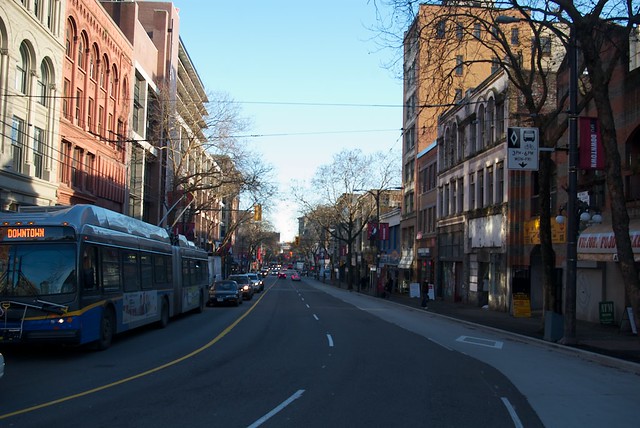
Grassroots activism has won social housing above the new library to be built on the 700-block of East Hastings. The development will now include 20 units of family social housing for single mothers and their children. The City of Vancouver’s March 22 media release and press conference announcing the new housing made no mention of the tireless activism that made the housing possible. But the truth is that the City preferred not to build the housing, and had to be pushed every step of the way by residents to make it a reality. Activists held a party of their own to celebrate their housing victory (see Murray Bush’s wonderful article).
“One of the most important things is for us to celebrate our victories,” said Beth Malena at yesterday’s Downtown Eastside Neighbourhood Council (DNC) general meeting. Malena told a crowd of 100 DNC members that the housing victory wouldn’t have happened without them. “The City gave zero credit to you all. They probably don’t want to remember that they needed to be pressed to do something that’s such a no brainer.”
The library struggle
Indeed, City Council had to be dragged, practically kicking and screaming. In the summer of 2010, DNC members Fraser Stewart, Rene Belanger, and others collected 1,500 signatures for a petition supporting social housing above the proposed library. The petition was presented to the Library Board and City Council, and the latter passed a motion to “explore the possibility” of housing on the library. But by Oct 7 2010, City staff asked Council to vote against social housing on the library.
It was clear to activists that very little effort had been made by the City to “explore the possibility” (see this letter to Council). Over 50 housing supporters came to the Oct 7 Council meeting to make their case. See here for the video.
The City already owned the land, but Councilors claimed that there was no money to build the housing above. Infamously, Gregor Robertson claimed “there is no money in the drawers” (this was only months after deep cuts to business taxes). Furthermore, Councilor Geoff Meggs argued passionately that it was so urgent to begin building the library that we could not wait even a few more months to secure funding for social housing. As a last resort, housing advocate Wendy Pederson of the Carnegie Community Action Project asked that, at the very least, the material foundations of the library be built such that they could support possible housing in the future. Council voted to proceed with a stand-alone library, with the caveat that the City manager could have an extra month or two to secure funding for housing.
DNC member Dave Murray told the Vancouver Media Coop that after the meeting “we were so let down, they voted 9-1 against us. I remember walking away very depressed thinking that was that.” But activists did not give up. On Oct 21st, a demonstration was held outside the proposed library site, where kids and their parents demanded both books and housing. The next day, activists confronted the Mayor and Councilors at a $500/plate fundraiser lunch with the business elite, demanding that real action be taken to build housing on the library.



